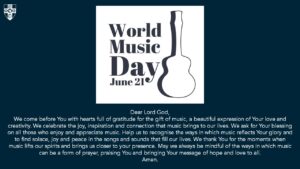World Music Day is a vibrant celebration of the universal language of music. For Catholics, this day is an invitation to reflect on the profound role music plays in worship, culture and the expression of our faith. Music has the unique ability to elevate the human spirit, connect us to the divine, and unite us as a global community.
From the earliest days of the Church, music has held a central place in Catholic worship and spiritual life. The Psalms, often referred to as the Bible’s hymnbook, are filled with songs of praise, lament and thanksgiving, demonstrating the integral role of music in expressing the depths of the human experience in relation to God.
Saint Augustine famously said,”He who sings, prays twice,” highlighting the power of music to deepen our prayer and connection to God. Singing allows us to engage more fully in worship, using our voices to praise God and lift our spirits. Music, as an art form, touches the soul in ways that words alone cannot, bringing us closer to the mystery of the divine.
Music in Catholic worship serves multiple purposes: it glorifies God, unites the congregation, and enhances the liturgical experience. The Church’s rich musical tradition includes Gregorian chant, hymns and contemporary sacred music, all of which contribute to the beauty and solemnity of the liturgy.
Gregorian chant, with its serene and meditative quality, has been used for centuries to foster a sense of reverence and contemplation. Hymns and sacred songs, whether traditional or modern, provide a way for the faithful to participate actively in the Mass, joining their voices in communal prayer.
Pope Benedict XVI, a strong advocate for the importance of sacred music, emphasised that music in the liturgy should “inspire reverence and prayer and help build a community of faith.” This perspective calls us to appreciate and preserve the musical traditions of the Church while also embracing new expressions of faith through music.
World Music Day reminds us that music transcends cultural, linguistic and geographical boundaries. it is a universal language that can unite people from diverse backgrounds and foster a sense of global solidarity. This universality of music reflects the Catholic principle of the unity of all humanity, created in the image and likeness of God.
Catholic social teaching emphasises the dignity of every person and the importance of building a just and compassionate world. Music can be a powerful tool in this mission, promoting peace, understanding, and mutual respect. By sharing and celebrating the diverse musical traditions of different cultures, we honour the richness of God’s creation and the unity of the human family.
World Music Day is an opportunity to celebrate the gift of music and its profound impact on our lives and faith. As Catholics, we recognise music as a powerful expression of God’s beauty and a means of deepening our relationship with Him. Whether through the solemnity of Gregorian chant or the joy of contemporary hymns, music has the power to elevate our worship, unite us as a community, and reflect the universal harmony of creation.
Let us give thanks for the gift of music, support those who bring it to life, and allow it to inspire us to live more fully in harmony with God and one another. May our voices, united in song, be a testament to the love, peace and unity that Christ calls us to embody.


